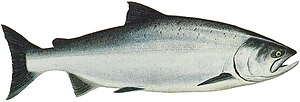The study was conducted after concerns were raised about ISA possibly appearing in Washington waters and potentially impacting Washington’s salmon. The study involved the improvement of testing protocols for the virus and to better detect ISA in a variety of fish species. It included samples from wild and hatchery-produced Pacific Chinook, coho, sockeye, chum and steelhead as well as farm-raised Atlantic salmon.
ISA was not detected in any of the more than 900 tissue samples that were taken.
“This study reinforces the findings of the Canadian Food Inspection Agency and the results of the Provincial Government’s labs that ISA has not been found in the waters of the Pacific Northwest or in BC,” said Mary Ellen Walling, executive director with the BC Salmon Farmers Association.
Members of the BCSFA participate in regular testing of our farm-raised fish for ISA. In 2012, around 1,000 fish were tested: all returning negative results.
The Washington State testing is part of a two-year monitoring program specifically designed to detect ISA and will continue for another year.
“We know all the world’s oceans are connected, so a virus from another part of the world may eventually make its way to BC,” said Walling. “That’s why rigorous screening and this kind of on-going testing is important. It means that if a virus is detected it can be found early and properly dealt with.”
More information on the Washington study can be found at:
http://www.wdfw.wa.gov/conservation/research/projects/salmon_anemia/ |
| Drawing of Ocean Phase Chinook (king) salmon (Oncorhynchus tshawytscha) (Photo credit: Wikipedia) |


No comments:
Post a Comment